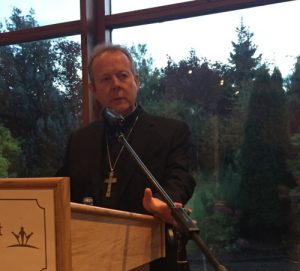
By Sarah Mac Donald - 09 May, 2017

Archbishop Eamon Martin
The Church in Ireland has no desire to create a theocracy north or south of the border, the Primate of All Ireland has said.
Delivering a lecture at the University of East Anglia in Norwich as part of the Newman Lectures, Archbishop Eamon Martin stressed that the Church does, however, expect that in a true pluralist democracy or republic, religion and faith will continue to have an important part to play in the national conversation.
Speaking on the theme ‘The Church in the Public Sphere – a perspective from Ireland’, the Primate said there was a tendency in some public discussions to caricature faith schools, faith hospitals or people of faith as “unmodern”, “authoritarian”, “hypocritical”, “bigoted”, or “closed” to progress and personal rights and autonomy.
In this context, the decades of service of nuns and priests in the education and healthcare of people in Ireland and all over the world was being “obliterated” by a “narrow narrative” that “religious ethos cannot be good for democracy”.
Archbishop Eamon Martin’s comments were made as the row over the ownership of the National Maternity Hospital and the involvement of the Religious Sisters of Charity who own St Vincent’s Hospital continues.
In his address on Monday night, Archbishop Martin suggested that what the Church in Ireland is experiencing today is a reaction to its perceived paternalism or authoritarianism in the past.
He also acknowledged that the sins and crimes of child sexual abuse in the Church and “other shameful episodes” of the past had damaged the Church’s credibility.
“When we attempt as Church to speak in the public sphere about the right to life of the unborn, some are quick to point to the scandals and to shameful stories of the past,” he said.
He said the abuse scandals not only had tragic consequences in the lives of victims and their families, but had weakened the Church’s witness.
On secularism’s challenge to the Church, he said there was no question that the practice of faith in Ireland has been hugely exposed to, and challenged by, the prevailing culture and that it was moving rapidly from a society where it had been virtually impossible not to believe in God to one where faith is one among a number of options.
The Primate noted how the latest census figures had shown that in just five years the number of people identifying as Catholic has declined by 5 per cent to 78 per cent of the population. In parallel with this decline, there has been an increase in the number of people who profess no religious belief.
However, little appetite existed for any substantial critique of the prevailing culture by people of faith, particularly if it presents any serious questioning of the “almost compulsory consensus on controversial issues”.
Arguing that faith needs reason and reason needs faith, he referred to Pope Benedict’s call for a profound dialogue between faith and reason to rid faith of distorted forms of religion, such as sectarianism and fundamentalism and the distortion of reason such as that resulting from totalitarian ideology.
Acknowledging that people of faith need to have a broad back in the public square, particularly on social media, where they often have to endure insult or ridicule, or even personal attack simply for being present in the public square at all, he warned the Church against becoming defensive in reaction to criticisms.
The response, rather, should be one of thankfulness that “the lid has been lifted on a terrible and shameful chapter of our history and at last giving a voice to those who for years have been carrying a lonely trauma”.
Expressing his hope that the failures of the past would not be allowed to define the Church, he suggested that they should instead “help all of us in the public sphere learn lessons for the present about where Church and society might today be similarly marginalising the poor, stigmatising the unwanted or failing to protect the most vulnerable.
“It is important for us to learn new ways of presenting our sincerely held perspectives alongside others of other faiths and none, and to encourage conversations at a national level on significant issues and values,” the Archbishop said. He referred to theologian Cathleen Kaveny’s third way, which she calls ‘the culture of engagement’.
Despite the voices nowadays which might tempt the Church into pointless culture wars, or even suggest that Christians might opt out of the public square to some sort of ‘parallel polis’, Archbishop Martin said he was “completely convinced that the voice of faith can and should remain engaged in the public square.
“Our faith is not simply for the privacy of our homes and churches. The Gospel is meant for mission. It is not to be cloistered away from the cut and thrust of public discourse,” he said.